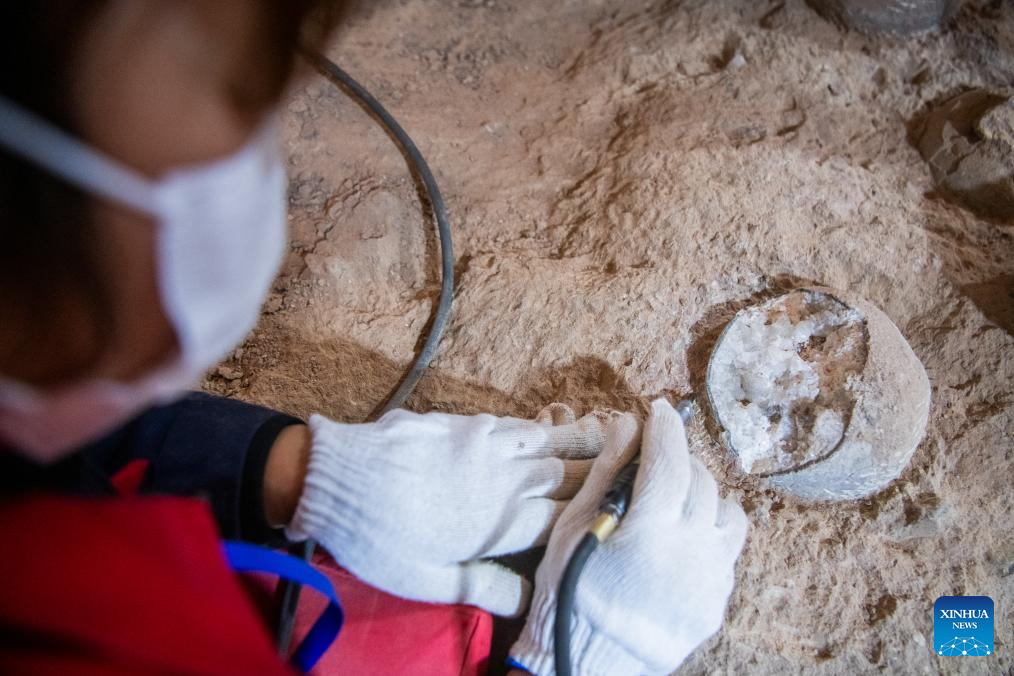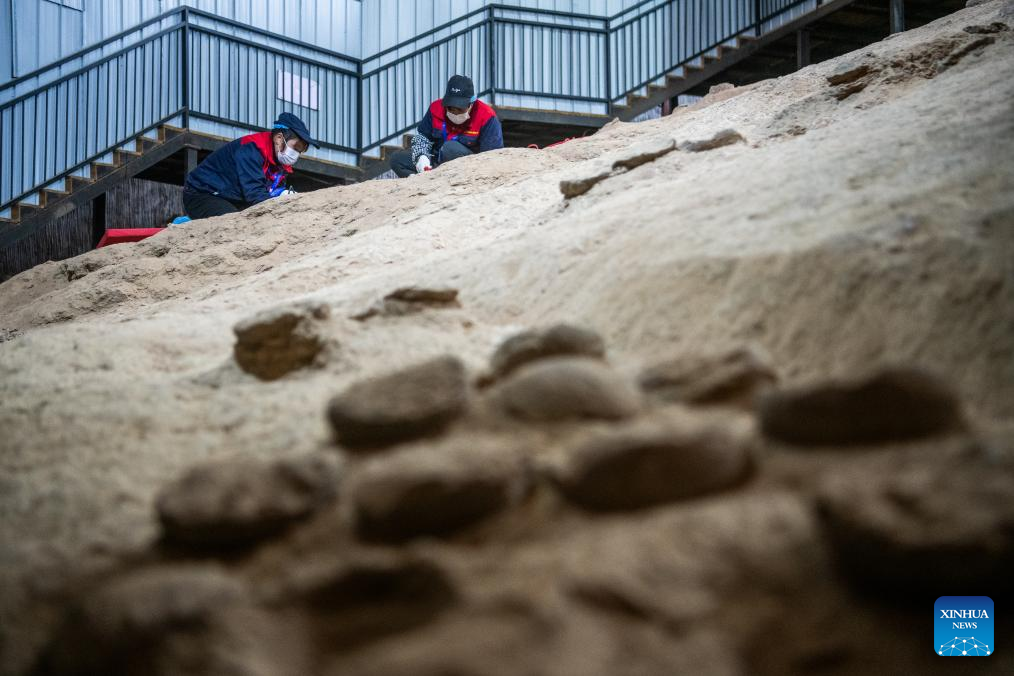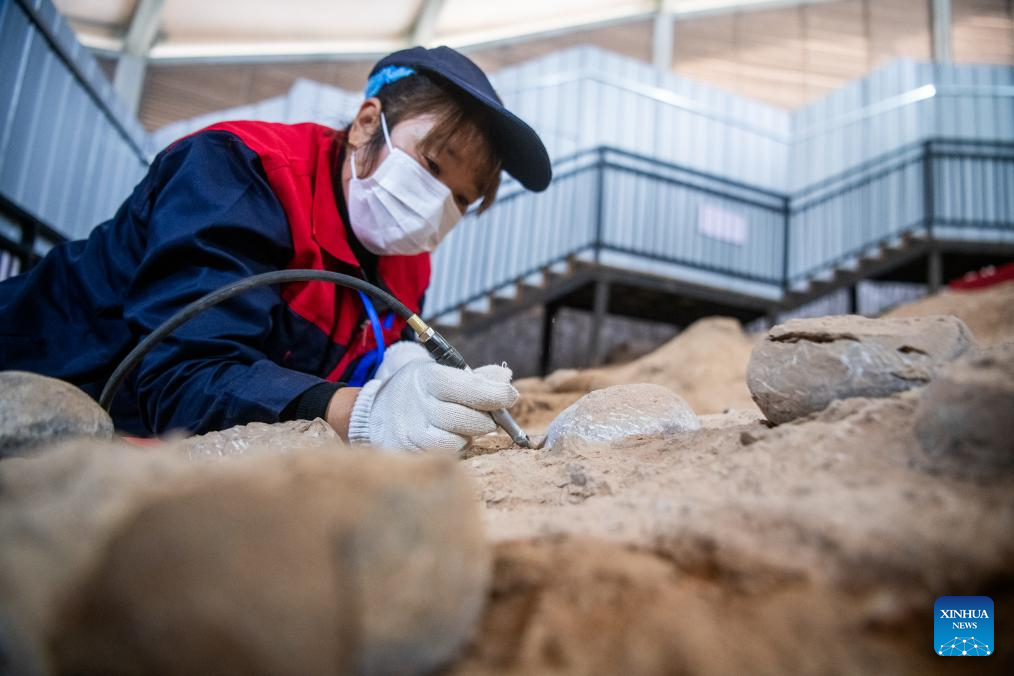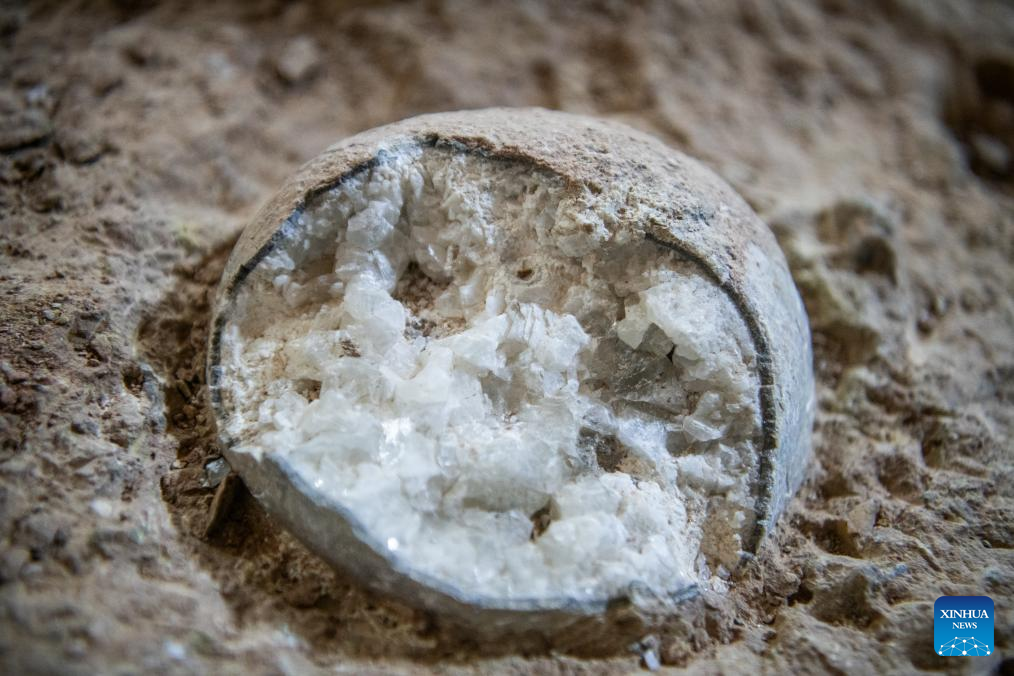
A staff member works on a crystallized dinosaur egg fossil at Qinglong Mountain in Shiyan City, central China's Hubei Province, Dec. 22, 2023. Three crystallized dinosaur egg fossils were discovered in central China's Hubei Province, offering evidence for the study of dinosaur egg-laying processes and the paleoenvironment, according to a local nature reserve.
These crystallized dinosaur egg fossils were found in a nest containing 31 dinosaur egg fossils at Qinglong Mountain in Shiyan City during the process of restoration and management of a dinosaur egg fossil outcrop. (Xinhua/Wu Zhizun)
WUHAN, Dec. 22 (Xinhua) -- Three crystallized dinosaur egg fossils were discovered in central China's Hubei Province, offering evidence for the study of dinosaur egg-laying processes and the paleoenvironment, according to a local nature reserve.
These crystallized dinosaur egg fossils were found in a nest containing 31 dinosaur egg fossils at Qinglong Mountain in Shiyan City during the process of restoration and management of a dinosaur egg fossil outcrop.
The three egg fossils are all well-preserved with the eggshells and internal crystalline mineral intact, said Zhao Bi, a scholar with the Hubei Institute of Geosciences, adding the three egg fossils are believed to be uncracked and unhatched eggs.
Researchers have found that the internal crystalline mineral type of these crystallized egg fossils is calcite with a particle size of 0.2-0.4 cm.
Compared with regular fossilized dinosaur eggs, crystallized dinosaur egg fossils are rare in the world due to the harsh environmental conditions required for their formation. This is the first time crystallized dinosaur egg fossils have been found in Hubei Province.
The three egg fossils remained intact despite subsequent burial and diagenesis, and the internal crystalline minerals formed during the burial and diagenesis of the eggs when a large volume of supersaturated calcium carbonate solution infiltrated the eggshell pores, crystallizing and filling the eggs, according to Zhao.
Dinosaur egg fossil clusters, dating back to the middle Cretaceous period about 60 to 80 million years ago, were first discovered at Qinglong Mountain in 1995. To date, researchers have found nearly 3,000 surface-exposed or well-preserved egg fossils at the site. ■

Staff members work on crystallized dinosaur egg fossil at Qinglong Mountain in Shiyan City, central China's Hubei Province, Dec. 22, 2023. Three crystallized dinosaur egg fossils were discovered in central China's Hubei Province, offering evidence for the study of dinosaur egg-laying processes and the paleoenvironment, according to a local nature reserve.
These crystallized dinosaur egg fossils were found in a nest containing 31 dinosaur egg fossils at Qinglong Mountain in Shiyan City during the process of restoration and management of a dinosaur egg fossil outcrop. (Xinhua/Wu Zhizun)

A staff member works on a crystallized dinosaur egg fossil at Qinglong Mountain in Shiyan City, central China's Hubei Province, Dec. 22, 2023. Three crystallized dinosaur egg fossils were discovered in central China's Hubei Province, offering evidence for the study of dinosaur egg-laying processes and the paleoenvironment, according to a local nature reserve.
These crystallized dinosaur egg fossils were found in a nest containing 31 dinosaur egg fossils at Qinglong Mountain in Shiyan City during the process of restoration and management of a dinosaur egg fossil outcrop. (Xinhua/Wu Zhizun)

This photo taken on Dec. 22, 2023 shows a crystallized dinosaur egg fossil at Qinglong Mountain in Shiyan City, central China's Hubei Province. Three crystallized dinosaur egg fossils were discovered in central China's Hubei Province, offering evidence for the study of dinosaur egg-laying processes and the paleoenvironment, according to a local nature reserve.
These crystallized dinosaur egg fossils were found in a nest containing 31 dinosaur egg fossils at Qinglong Mountain in Shiyan City during the process of restoration and management of a dinosaur egg fossil outcrop. (Xinhua/Wu Zhizun)



